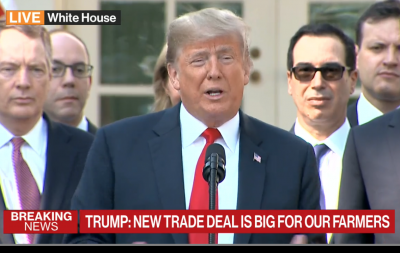As a result of the attack on Iran, nitrogen fertilizer at the port of New Orleans has seen an increase in price this week. Urea prices for barges in New…
Trump Vows to ‘End the Electric Vehicle Mandate’ in GOP Acceptance Speech
In his acceptance speech at the Republican National Convention late last week, former President Donald Trump made no direct mention of agriculture, but he touched on a number of issues — electric vehicles, clean energy and trade — that directly affect the agriculture industry.
“Trump started the rambling 1½-hour speech on a unifying note and by recounting, for the first time in public, how he escaped assassination on Saturday in Butler, Pennsylvania,” Agri-Pulse’s Philip Brasher reported late last week. “…But Trump eventually pivoted into long riffs on his priority issues, including trade, energy and immigration.”

Electric Vehicles
Trump made perhaps his strongest remarks when it came to electric vehicles, with Bloomberg’s Ari Natter reporting that “former President Donald Trump used his nomination speech to take aim at President Joe Biden’s electric vehicle policies, vowing to action against them on his first day in office.”
“‘I will end the electric vehicle mandate on day one,’ Trump said in his address at the Republican National Convention in Milwaukee. The move would result in ‘saving the US auto industry from complete obliteration, which is happening right now, and saving US customers thousands and thousands of dollars per car,’ he said,” Natter reported. “While the Biden administration doesn’t have a mandate on electric vehicles, critics of new air-pollution limits issued by the Environmental Protection Agency in March have said they would illegally force automakers to sell EVs.”
Agri-Pulse’s Philip Brasher reported late last week that “corn growers and ethanol producers fear the emission standards will depress demand for ethanol-blended gasoline, although it’s not clear how much and how fast the reduction in demand would be. At the same time, the biofuel industry is looking to preserve tax incentives created by the IRA to subsidize production of sustainable aviation fuel.”
Clean Energy
Natter reported that “Trump’s remarks on EVs came just moments before he criticized what he said was trillions of dollars of wasteful spending ‘having to do with the green new scam.’ He said he would instead direct the money to projects like roads, bridges and dams, though it wasn’t immediately clear how he would make good on the pledge.”
Brasher reported that the green new scam “was an apparent reference to the Inflation Reduction Act enacted in 2022. The IRA, which included funding for farm bill conservation programs, was estimated to cost well under $1 trillion. But Trump promised to somehow redirect clean energy funding to infrastructure projects. ‘We will not allow it to be spent on Green New Scam ideas,’ Trump said,” according to Brasher’s reporting.
Trade
Brasher reported that “Trump didn’t directly talk about his pledge to impose across-the-board tariffs on imported products and duties of up to 60% on China. But he promised to bring more auto manufacturing to the United States, threatening to impose tariffs of 100% to 200% on foreign-made autos. ‘They will be unsellable in the United States,’ he said.”
“He also touted his administration’s trade record,” Brasher reported. “‘We have long been taken advantage of by other countries, and think of it, oftentimes these other countries are considered so-called allies,’ Trump said. ‘We lose jobs, we lose revenue, and they gain everything, and wipe out our businesses, wipe out our people. I stopped it for four years, I stopped it.'”
“He also mentioned the U.S.-Mexico-Canada trade agreement that replaced the North American Free Trade Agreement, which Trump called the ‘worst trade deal ever made,'” Brasher reported.
Trump’s comments on trade followed a speech from his pick for vice president, J.D. Vance, who “blames increased trade with China, Mexico and other low-wage countries for job losses that have devastated manufacturing communities in the industrial Rust Belt, including his home state of Ohio,” according to reporting from Bloomberg’s Steven T. Dennis and Mark Niquette.





